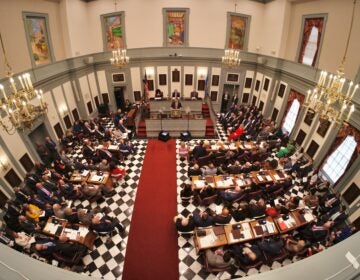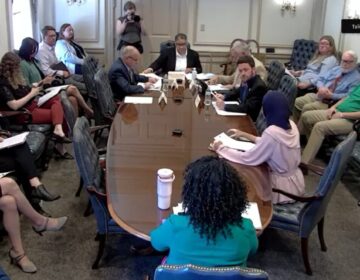Delaware encourages infrastructure and use of electric vehicles

Delaware is encouraging increased infrastructure and use of electric vehicles, like this Nissan Leaf.
Delaware is encouraging its residents to let go of the gas pump and embrace the charging station with an incentive program designed to promote a clean energy economy, and reduce greenhouse emissions that contribute to climate change.
On Thursday, Gov. Jack Markell and the Department of Natural Resources and Environmental Control announced the Delaware Clean Transportation Incentive Program, which offers rebates and grants for the increased infrastructure and use of electric, propane and natural gas cars.
The largest amounts of emissions in Delaware come from the transportation sector, according to the DNREC.
“It’s important we take steps that both clean up the environment and also are good for the economy,” Markell said during the announcement at Sheridan Nissan in New Castle.
Delaware has set aside $2.7 million in funding for the program, which consists of three rebate programs for consumers and two grants that provide financial incentives for the development of alternative fueling infrastructure.
Customers can receive rebates as high as $20,000 and developers can receive funding as high as $500,000.
Funding for the program is allocated from Delaware’s participation in the Regional Greenhouse Gas Initiative, a market based cap-and-trade program designed to reduce carbon dioxide and greenhouse gas emissions from the electricity generation sector.
“I think what this program embodies is providing people with a bit of an incentive to make a different choice in terms of their lifestyle and reducing their impacts on the environment,” said David Small, secretary for DNREC.
The program also is an extension of President Barack Obama’s efforts to tackle emissions in the nation, said William Early, the U.S. Environmental Protection Agency Region III Deputy Administrator.
“The clean power plan will make our economy stronger, turning climate challenges into economic opportunities,” he said. “It will signal to markets the transition to low carbon economy is inevitable.”
Seven Delaware auto dealers have partnered with DNREC to assist and promote the program, including: Sheridan Nissan in New Castle; Auto Team Delaware, Diver Chevrolet and Sheridan Ford in Wilmington; I.G. Burton in Milford; Willis Chevrolet Buick and Willis Ford in Smyrna—all which carry popular electric vehicles.
As fuel prices went down, electric vehicles became less popular, said Joe Sheridan, owner of Sheridan Nissan and Sheridan Ford. Sales for the environmentally-friendly cars are down about 40 percent from when gas prices were higher, he said.
Electric cars are usually more expensive than gas powered cars. The Nissan Leaf, for example, currently sells in the $30,000 range, Sheridan said. However, he said other cost savings balance out the ticket price.
“What do you spend on fuel a month? If it’s $1,000 more to buy it or a few thousand dollars, what would you spend on gas during that period?” Sheridan said. “You have to look at the whole package. Incentives like this bring that balance package down.”
Delaware has already reduced greenhouse gas emissions by about 30 percent over the past decade—more than any other state, according to the U.S. Department of Energy.
The State has implemented about $100 million in energy efficiency projects in state buildings, universities and schools. Businesses have also received about $10 million in grants to make additional investments in being energy efficient.
Delaware has reduced vehicle miles, and has started using more electric cars. The Department of Education also has added propane powered school buses to decrease emissions.
“This program is another step we’re taking to make us a leader in this area,” Markell said. “It creates more construction jobs, jobs in dealerships, jobs in the electricity sector, which will help people across the state.”
However, Delaware still faces some challenges, such as ground level ozone, commonly known as smog, and the reduced air quality due to very hot, sunny days. The elderly, children and individuals with respiratory illnesses are most affected by poor air quality. Asthma diagnoses also has increased in the state.
The incentive program is another way to alleviate poor air quality in Delaware, Small said.
“Everything we can do to reduce those kinds of impacts has a public health benefit, an environmental impact and an economic benefit,” he said.
WHYY is your source for fact-based, in-depth journalism and information. As a nonprofit organization, we rely on financial support from readers like you. Please give today.





